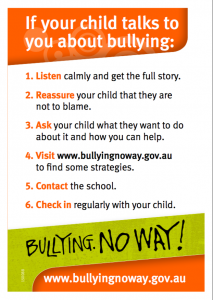5 Tips for what to do when bullying occurs;
- Encourage our kids to speak up about bullying. Encouraging our kids to speak up about bullying when it occurs – to say “No!” and to protect each other is an important way to prevent bullying from occurring. We can encourage them and teach them how to communicate their boundaries assertively and protect themselves when situations like this happen.
- Protect ourselves and our families from cyber bullying.
- – Know your passwords, change them regularly and don’t give them out to others.
– Regularly check privacy settings to ensure you are controlling who sees the content that is put online.
– Don’t open messages from people that you don’t know or messages that may seem strange.
– Make sure kids obtain consent from their parents before giving out any personal details online.
– If anyone says something that makes you uncomfortable or anything that is hurtful, leave straight away. - Educate your kids about bullying. It is important to provide our children with education and information about what bullying is. This includes what it looks like, what it feels like and what it means for us and others. There are a variety of resources online for different ages and in print, book, video and game form.
- Talk about bullying when it happens. Talk to our children about the experiences they have, whether they are directly involved in the bullying or whether they have experienced it through, television, books or others at school. Discussing these situations provides our children with the opportunity to express themselves, ask questions and increase their knowledge around how to cope when bullying occurs.
6 Tips If your child talks to you about bullying.
Bullying No Way have provided excellent information about what to do if your child talks to you about bullying. How we respond in these situations can have an impact on how our child copes, how they view bullying and how they will address similar situations in the future.
- Listen calmly and get the full story. Children need to feel heard and to debrief about their experiences. The more information we obtain can be used to develop an appropriate response and to problem solve.

- Reassure your child that they are not to blame. It is common for children to experience feelings of guilt and shame when they are bullied and reassurance can greatly assist to combat this.
- Ask your child what they want to do about it and how you can help. Asking (rather than telling or doing) provides an opportunity for our children to develop their own problem solving skills, feel a sense of control and feel empowered. Being there to support your child and provide assistance and direction when needed will help them to build their confidence when dealing with difficult situations.
- The website www.bullyingnoway.gov.au has excellent resources for both parents and children in a range of formats (books, video, games) around how to cope with bulling and what to do.
- Contact the school and advise them of the bullying and work with them to develop a prevention strategy which involves your child.
- Check in regularly. Ongoing communication about bullying is even more important once your child in directly involved. Checking in around how they are feeling, what is happening at school and at home and whether the situation has changed is important to ensure resolution and prevention of bullying.
If you or someone you know has been impacted by bullying, The Psych Professionals are here to help. We offer remote telehealth consultation or if you are in Cleveland or Loganholme in Qld Australia, book an in-person appointment with our psychologists
